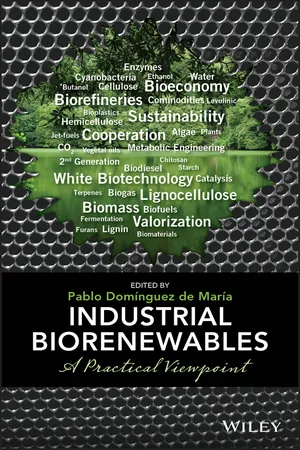
- English
- ePUB (mobile friendly)
- Available on iOS & Android
About this book
INDUSTRIAL BIORENEWABLES A Practical Viewpoint
This unique text provides an in-depth industrial view in its discussion of industrial biorenewables; industries report on real cases of biorenewables, dealing with economics, the motivation of implementing industrial biorenewable-based processes, and suggestions for further improvement and research.
- Includes industrial perspectives by scientists working on biorenewable technology in industry, with a clear commercial focus
- Spans basic research to commercialization of processes and everything in between
- Provides key information for academic groups working in the area by covering the way industrial scientists tackle problems
- Showcases patented technologies across diverse industries, shares the motivation of implementing industrial biorenewable-based processes, and suggests options for further improvement and research
- Serves as a guide for industries and academic groups, providing crucial information for the setup of future biobased industrial concepts
Industrial Biorenewables provides a state-of-the-art perspective, offering a unique viewpoint from which a range of industries report on real cases of biorenewables, demonstrate their technologies, share the motivation of implementing a certain industrial biorenewable-based processes, and suggest options for further improvement and research. With an in-depth industrial viewpoint, the book serves as a key guide for industries and academic groups, providing crucial information for the setup of future biobased industrial concepts.
Tools to learn more effectively

Saving Books

Keyword Search

Annotating Text

Listen to it instead
Information
Chapter 1
AkzoNobel: Biobased Raw Materials
- 1.1 AkzoNobel's Biobased Raw Materials Strategy in Context
- 1.2 AkzoNobel in the Value Chain
- 1.3 Drivers Behind Development of the Biobased Raw Material Strategy
- 1.3.1 Background
- 1.3.2 Existing Use of Biobased Raw Materials
- 1.3.3 Emerging Products from Biobased Raw Materials
- 1.3.4 Triggers to Developing an AKZONOBEL Biobased Strategy
- 1.3.5 Developing the Biobased Chemicals Strategy
- 1.4 Conclusions of the Biobased Chemicals Strategy
- 1.5 Implementing the Strategy: Striking Partnerships
- 1.6 Experience to Date
- 1.7 Measuring, Reporting, and Ensuring Sustainable Sourcing of Biomass
- 1.8 Book and Claim
- 1.9 Sustainability in the Value Chain: LCA
1.1 AkzoNobel's Biobased Raw Materials Strategy in Context
1.2 AkzoNobel in the Value Chain
- Performance coatings. Performance coatings are used predominantly for protection, mainly to industrial consumers having hundreds of uses across a wide range of industries and sectors including automotive, consumer electronics, aviation, shipping and leisure craft, sport equipment, construction, furniture, and food and beverage.
- Decorative paints. Our decorative paints business is the world's leading decorative architectural paints company supplying a full range of interior and exterior decoration and protection products for both the professional and the do-it-yourself markets. The product range includes paints, lacquers, and varnishes as well as products for surface preparation (predeco products). We also supply building adhesives and floor leveling compounds for tile, floor, and parquet layers.
- Specialty chemicals. AKZONOBEL is a major supplier of specialty chemicals with leading positions in selected market segments. Our products are used in a wide variety of everyday products such as ice cream, soups, disinfectants, plastics, soaps, detergents, cosmetics, paper, and asphalt.
1.3 Drivers Behind Development of the Biobased Raw Material Strategy
1.3.1 Background
Table of contents
- Cover
- Title Page
- Copyright
- Table of Contents
- List of Contributors
- Preface
- Chapter 1: AkzoNobel: Biobased Raw Materials
- Chapter 2: Arizona Chemical: Refining and Upgrading of Bio-Based and Renewable Feedstocks
- Chapter 3: Arkema: Castor Reactive Seed Crushing Process to Promote Castor Cultivation
- Chapter 4: Avantium Chemicals: The High Potential for the levulinic product tree
- Chapter 5: C5LT: Biorenewables at C5 Ligno Technologies AB
- Chapter 6: Cepsa: Towards The Integration of Vegetable Oils and Lignocellulosic Biomass into Conventional Petroleum Refinery Processing Units
- Chapter 7: DuPont: Biorenewables at E.I. DU Pont DE Nemours & Co
- Chapter 8: Evonik: Bioeconomy and Biobased Products
- Chapter 9: Market Structure and Growth Rates of Industrial Biorenewables
- Chapter 10: Göteborg Energi: Vehicle Fuel From Organic Waste
- Chapter 11: Greasoline: Biofuels From Non-food Materials and Residues
- Chapter 12: Green Applied Solutions: Customized Waste Valorization Solutions for a Sustainable Future
- Chapter 13: Grove Advanced Chemicals: Flox® Coagulants – Environmentally Friendly Water and Wastewater Treatment Using Biodegradable Polymers From Renewable Forests
- Chapter 14: Heliae Development, LLC: An Industrial Approach to Mixotrophy in Microalgae
- Chapter 15: InFiQuS: Making the Best of Leftovers
- Chapter 16: Biorenewables at Mango Materials
- Chapter 17: Novamont: Perspectives on Industrial Biorenewables and Public-Private Needs
- Chapter 18: Novozymes: How Novozymes Thinks About Biomass
- Chapter 19: Organoclick: Applied Eco-Friendly and Metal-Free Catalysis for Wood and Fiber Modifications
- Chapter 20: Petrobras: The Concept of Integrated Biorefineries Applied to the Oleochemistry Industry: Rational Utilization of Products and Residues via Catalytic Routes
- Chapter 21: Phytonix: Cyanobacteria for Biobased Production Using CO2
- Chapter 22: Phytowelt Green Technologies: Fermentation Processes and Plant Breeding as Modules for Enhanced Biorefinery Systems
- Chapter 23: Biorenewables at Shell: Biofuels
- Index
- End User License Agreement
Frequently asked questions
- Essential is ideal for learners and professionals who enjoy exploring a wide range of subjects. Access the Essential Library with 800,000+ trusted titles and best-sellers across business, personal growth, and the humanities. Includes unlimited reading time and Standard Read Aloud voice.
- Complete: Perfect for advanced learners and researchers needing full, unrestricted access. Unlock 1.4M+ books across hundreds of subjects, including academic and specialized titles. The Complete Plan also includes advanced features like Premium Read Aloud and Research Assistant.
Please note we cannot support devices running on iOS 13 and Android 7 or earlier. Learn more about using the app